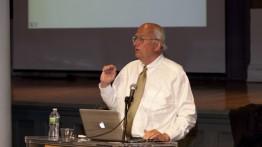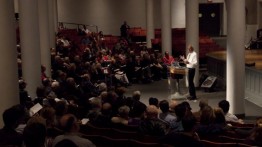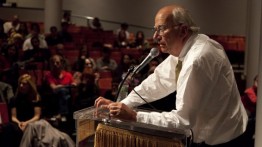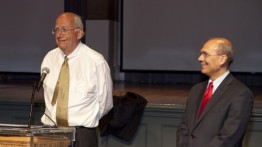Mechanistic Brain, Free Mind
POSTED ON: April 17, 2012
David Hume once described the concept of free will as one of the most contentious questions of metaphysics. To many of the towering figures of Western science, it was determinism—free will's antagonist twin—that was the no-brainer. From Copernicus to Newton, Darwin to Einstein to modern neuroscience, the dominant narrative goes something like this: the human brain is a mechanistic, determined system that responds with biological prejudice to a material, exterior world.
Einstein said it was "the awareness of the lack of free will" that prevented him from taking himself and his fellow men too seriously or from losing his temper about the actions of others. Tirelessly allegorized as an incredibly dense, complex machine, the brain in the popular scientific imagination becomes difficult to reconcile with many concepts that form the fabric of our society and values. How to rationalize retributive penal law if all crime is the product of antecedent historical, contextual and biological factors? And are we ready to surrender to a biological determinism that would equate a person's taste in music and likelihood of committing murder or writing poetry to a predictable formula of genetic predisposition and life experience? Or, in other words, are we ready to understand ourselves as machines in a world increasingly populated by them?
It's this biologistic view of the brain that leading neuroscientist Michael S. Gazzaniga challenges in his recent book Who's In Charge? Free Will and the Science of the Brain. Speaking to a large audience in the Cooper Union's Great Hall, Gazzaniga borrowed a conceptual framework from computer science to argue for a mechanistic brain that enabled, rather than enslaved, a free mind.
Understanding human behavior required a multi-tiered view of the mind, Gazzaniga explained, not so different from that required to understand how modern computer networking works. In the popular OSI model of networking, a web browser renders content on the high-level "application" layer, taking for granted that the network packets which deliver that data piecemeal will function properly on the lower-level "transport layer." This transport layer in turn takes for granted that the even lower "physical layer" will ensure the signals and material links between communicating machines are reliable and delivering data in a timely and coherent fashion.
Similarly in Gazzaniga's view, a free mind takes for granted a lower-level mechanistic brain, but is not beholden to it.
His humanistic and sober talk created a lively question and answer session, drawing comments from both admiring graduate students and detractor peers.
The audio of his full talk on April 11, 2012, is presented below.








